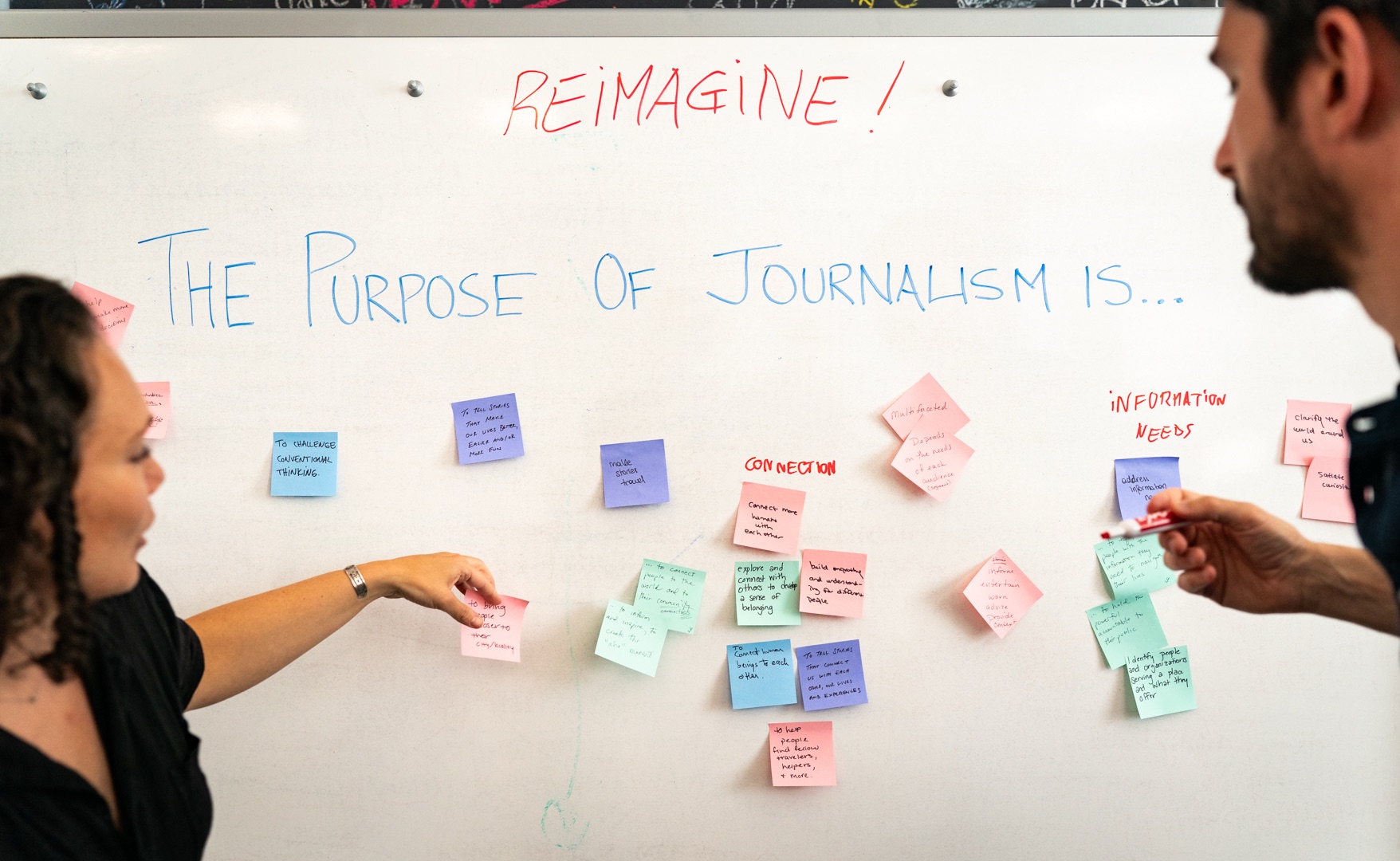As digital media companies become tech companies, their need for people with technical backgrounds grows, creating opportunities for software developers interested in journalism and media.
“I encourage technologists, product managers, project managers and anyone from outside the industry to come to the news because we need you, and your democracy needs you,” said Brian Boyer, former vice president of product and people at Spirited Media.
Twelve years ago, Boyer left a career as a software engineer to become one of the first two journalism master’s students to attend Medill under a Knight Foundation-funded scholarship program designed to bring experienced software developers into media. Since then he has worked as an editor and product manager for the Chicago Tribune, NPR, Spirited Media and Hearken.
“This is a great higher calling,” Boyer said. “It’s also a very frustrating industry to work in.”
To better understand the challenges and opportunities that await programmers entering the media industry, I spoke with Boyer and Kavya Sukumar, a 2013 Knight scholarship recipient and the current vice president of product at Hearken, about their experiences and the advice they would have for software developers thinking about where they fit in the media landscape.
Finding the type of work that is right for you

For programmers, leaving tech and entering an industry dominated by non-programmers poses a number of challenges, starting with understanding the different types of engineering jobs in media.
“At one end of the spectrum, there’s a lot of people who are doing something much closer to data science in the newsroom,” Boyer said. “They’re using databases, using surveys, making their own data.” These programmers tend to focus on creating tools for the newsroom, Sukumar said. Meanwhile, at larger companies like Gannett and Tribune Publishing, there are programmers working on large content management systems or advertising systems who are virtually indistinguishable from software developers working at Kraft or General Motors, Boyer said.
Between those two extremes are the programmers at small and medium-sized news organizations, who typically work in small teams that might also include a UX designer and a product manager. These programmers work much more closely with internal stakeholders in advertising, membership and the newsroom.
Boyer’s first newsroom jobs after Medill, at Pro Publica and National Public Radio, were focused on data journalism and visual storytelling. He left the newsroom to get into product roles and refocus his career on helping local news become financially viable. Most recently he’s been consulting with different news organizations.
Whether programmers are working in the newsroom to create graphs and charts that help readers understand critical news stories or building internally-facing products that help drive revenue, they are actively participating in journalism. Programmers who are excited by this work will have to learn to adapt to working in an industry where most of their colleagues do not have a technical background and it is up to the engineer to communicate their work clearly.
Think about user needs before formulating a solution
Product people from tech or engineering backgrounds are often more focused on how a product solution is delivered than how to understand the needs of users, Sukumar said. Cultivating empathy for users, including colleagues in the newsroom, is essential. In smaller organizations, product roles often require that programmers interview users and advocate for the audience as part of the product team, Boyer said. A human-centered design approach can help guide programmers through the stages of user research and ideation before the solution-development phase.

When compared to journalists who have learned to code, programmers trained in engineering and computer science often have an advantage.
“Most developers who work in the newsroom – this is me generalizing – are people who are self-taught,” Sukumar said. “Usually self-taught programmers don’t think of programming as their main role, it’s more of a means to an end.”
People trained in engineering and computer science have a better command of their code and therefore have a much stronger sense of which types of product ideas are feasible and how best to deliver them, Sukumar said. This knowledge is particularly useful when trying to rein in over-ambitious product ideas.
When working within constraints, know your limits and understand you have options
Due to resource constraints, editorial and product teams are often made up of generalists. “Our product teams, our editorial teams, they’re small shops,” Boyer said. “Having a technical background means I can wear one more hat than most other people.”
But it’s easy for programmers to become overextended in this environment, Sukumar said. “You’re either constrained in time, budget, or resources, and sometimes all three.”
Part of working in this environment means programmers may have to deal with crazy work hours, particularly around busy times, like leading up to an election. Sukumar said one of the primary reasons she chose to leave the newsroom in favor of a product role was to bring some predictability back into her schedule. This is the type of decision that engineers will need to make throughout their careers in the media industry. Boyer said that programmers should understand that if they feel like they need to leave the industry for a time, there will usually be opportunities for them to come back in the future.
Don't speak in jargon
Jargon plays a huge part in how software developers communicate with each other, but it gets in the way when programmers try to explain their work to non-programmers. When talking to non-programmers, Boyer explains that he doesn’t use a term such as “QA”, or even “quality assurance.” Instead, he says things like, “Let’s test the thing to make sure it works.”
Cutting jargon out of your vocabulary can be more difficult than it seems. Sukumar said she was unaware of how much she used jargon until she came to journalism school and, even then, it took her about three years to learn how to actively replace it.
“Think about every word you write, think about every word you say and ask yourself, ‘Is this a word a regular person would understand?’ Because there’s usually a replacement,” Boyer said.
Learn to measure your own output
Programmers work on a much longer cycle than their editorial colleagues, so it can be difficult to reconcile the digital news cycle with the time and resources it takes to create interactive content, special coverage and media products. Sukumar said that in her previous career at Microsoft, there was always someone else to quantify her work.
“Being able to quantify your contribution, that skill is lacking,” said Sukumar, who adds this is something she’s still working on. “A lot of times your output is not going to be measured by pageviews.”
I encourage technologists, product managers, project managers and anyone from outside the industry to come to the news because we need you, and your democracy needs you.
Brian Boyer
One way for programmers to do this is by measuring output against the metrics that non-technical stakeholders care about. Breana Jones, director of web product at Vice Media, said she tries to get non-technical colleagues to understand the value of removing “technical debt” – replacing old, inefficient code – on improving audience engagement. For instance, she has shown internal stakeholders that if a page loads even a few seconds faster, it would reach more users and engage them for a longer time.
Learn by doing
In most college classes, it’s hard to replicate product-management work. “For people who want to develop and create tools, I always recommend finding a project that you really admire, recreating it and learning where your gaps are.” Sukumar said.
If you’re interested in politics, for instance, start with election analysis and maps. Sukumar suggests sharing your work openly and reaching out to programmers who work in the newsroom for advice and collaboration opportunities. “A lot of news nerds are very collaborative,” Sukumar said.
Cultivate news judgment and empathy for the newsroom
While trained engineers have the skills to create technology-enabled products, they often lack news judgment and empathy for the newsroom.
“I often feel like learning journalism is harder than learning to code.” Sukumar said. While news judgment can be learned at journalism schools, engineers can learn through practice and exposure on the job. Less a skill than a mindset, engineers working in journalism should develop empathy for the newsroom, Sukumar said. This is particularly helpful for programmers working in product management, who must understand their internal users to develop products they will be using.
Be a team player
While working in the product and consulting world, Boyer learned to manage teams. He calls managing the secret to his success.
“Newsrooms are built out of individual actors.” Boyer said. “That’s not to say there aren’t teams in newsrooms, they’re just not part of the reward structure.”
Many organizations lack people who know how to manage projects or teams effectively, Boyer said. This is an area where programmers with experience leading projects can make a difference.
“I have many times in the past, and will again, hire people who weren’t necessarily the best programmers that were available to me, but who could talk, ask good questions and be thoughtful,” Boyer said. “Especially in product and in journalism, you have to be able to ask good questions.”
This article is one in a series exploring product thinking as an emerging discipline in journalism.
About the author





